- Home
- Sharyn McCrumb
If I'd Killed Him When I Met Him Page 2
If I'd Killed Him When I Met Him Read online
Page 2
I’m going to try to stick to what’s going on here, instead of writing analytical and/or maudlin letters about Us. I don’t need to belabor points about missing you, or being paralyzed with worry, because if everything turns out all right, these letters will look ridiculous, and if it doesn’t, I couldn’t bear to have a record of my sorrow. So I will make this a running journal of family life as I observe it.
The first observation, of course, is that there’s damned little family life to observe. I feel more like a war correspondent. Mother and Daddy are still in the process of divorcing, despite the best efforts of Bill and me to reconcile them. Now they aren’t even speaking to each other! We are obviously no great shakes as mediators, my brother Bill and I. If the UN sent us to the Middle East as peacekeepers, we could probably pull off Armageddon in a matter of days.
Bill is still eking out an existence in his Danville law practice with his partner A. P. Hill (who resembles her namesake, the Confederate general, except that she’s much more stern and commanding). I don’t know that I like her all that much, but I admire her for being such a force to be reckoned with. If I were five-foot-three-inches and blonde, I’d have gone for perky and cute, but A.P. somehow manages to be terrifyingly competent.
Since I haven’t had the peace of mind to go out looking for a job in my field, Bill and A.P. have sort of hired me (although I have more money than both of them put together) to be an “investigator” for their law firm, at an hourly wage that is laughable, especially considering that I have a Ph.D. But they mean to be kind, I know. They want to keep me busy. But so far there hasn’t been any call for an investigator’s talents (even assuming I had any). All their clients have either taken the plea bargain or agreed to work through their divorces without resorting to storm-trooper tactics.
That word again. Divorce.
At least you and I were spared that.
Sometimes I think that there is a great war going on between men and women. There is so much dislike and distrust in the air. Prenuptial agreements; kamikaze divorces; lawsuits over emotional matters: how very unromantic. The monasteries should be packing them in. Not that I care, personally, because at present I am a noncombatant. I am, as I said before, a war correspondent, writing sad communiqués to someone behind enemy lines.
I have no quarrel with you, dear Cameron. Except that you were selfish enough and stupid enough to go sailing away into the wild North Sea on that stupid, antiquated little boat. And so, goodbye for now, my dear. I must close.
If I knew where you were, I’d mail this.
Love,
Elizabeth
How do you like your snow white pillows,
And how do you like your sheets?
And how do you like the fair young maid
Who lies in your arms asleep?
—“LITTLE MARGARET”
(Traditional folk ballad)
THE FACT THAT Eleanor Royden was putting on lipstick at 4:45 was not unusual; the fact that it was 4:45 in the morning, however, made it an unprecedented departure from her usual routine. Eleanor was not known as an early riser, although, since the divorce, she’d had to get a clerical job, which meant that she had to show up at the real-estate office at 8:30 looking presentable. But she didn’t get up at 4:45 to do it. On a good day, she managed to rise (if not shine) at 7:45. But today was Sunday—no real-estate office to go to, and usually Eleanor slept in, letting the drapes stay drawn and the Sunday paper turn brown in the delivery tube until midafternoon. She used to read the society column, but none of those people spoke to her anymore anyway, since Jeb had kept the house and the country-club membership; so she no longer bothered to keep up with them.
She blotted the Berry Stain lipstick with a square of toilet paper and looked at herself in the medicine-cabinet mirror. Not bad for fifty-one, she thought. She had long ago lightened her mousy-brown hair to blonde, and now that it was surely gray under all that L’Oréal, the hair coloring gave her carefully bobbed hair the shimmer of moonlight. Cucumber slices placed under her eyes for fifteen minutes each night had gone a long way toward reducing the baggy look of half-a-century-old skin, but a face-lift would have been easier and more effective. In the right light she might pass for thirty-nine, she thought, as long as she remembered to keep her eyes wide open, arching her eyebrows for a face-lift via muscle control.
She let her features relax into a series of crow’s-feet and laugh lines, and the dozen years came seeping back, etching a great weariness on her face. She might look better if she hadn’t been up all night. But what did it matter if you could look thirty-nine, when she—the Bitch—was twenty-nine, not by artifice, but by the simple expedient of having been born during the presidency of Lyndon Johnson?
It wasn’t fair. Jeb certainly didn’t look thirty-nine. He had more white hair than a skunk—not the only thing the two creatures had in common. Eleanor smiled, etching wrinkles back into her face, which made her solemn again. Jeb was fifty-one. He did not jog. He did not starve himself. He did not take any steps to keep from getting run over by Time’s Winged Chariot. And that simpering teenage bride of his didn’t mind in the least. It was okay if men got old. She would see about that.
It wasn’t fair for him to have it all. He got to grow old gracefully, and still be loved, despite his age. He got to make a lot of money, and keep it all, even though she had given up a perfectly good bookkeeping job to marry him all those years ago. Even though she had cleaned his house to his fanatical standard of cleanliness; cooked delicious, well-balanced meals from his short list of acceptable foods; and played the thankless role of stage manager to his star turn in their upwardly mobile, career-oriented social life. He got all the applause: she got to do the housework backstage.
And now the play had closed. And good old Jeb was starring in a new production: same old show, but this time with a young and pretty leading lady to share the spotlight.
Eleanor never said that woman’s name aloud; she hardly ever thought it. Someday she might try to summon up the first name to find it had escaped her completely. Their last names were the same. That was the problem. Two Mrs. Roydens: the hag of marriage past, and the whore of marriage present.
Eleanor called her replacement the Bitch or the Bimbo. Sometimes in public Eleanor had called her La Chaplin, which her women friends understood to be a code term, referring to the silent film star’s greatest role: the Little Tramp.
At luncheons with her old friends, in the early days of the divorce proceedings, they had made a game of thinking up things to call the creature. To keep on saying the Whore would have been monotonous, and above all, one must not be tedious. Of course one had to put on a brave face, and affect amusement at Jeb’s stupid weakness and lust. (“Of course he had a pet name for his penis, dear. He wouldn’t want to be ordered about by a stranger.” Eleanor christened the future Mrs. Royden the Gap—not a reference to her fashion sense; the One-Trick Pony—not a musical reference; and, because the creature had been a landscape architect, the Lay of the Land.
Eleanor was the hit of the luncheon crowd with her wicked wedding parodies of Jeb’s second nuptials. “The organist ought to play ‘Send in the Clowns,’” Eleanor suggested. Her tablemates shrieked delightedly and countered with suggestions of their own: “Heat Wave,” “Almost Like Being in Love,” and “Call Me Irresponsible.”
She could get her wedding attire from Frederick’s of Hollywood, one of them suggested. “We could give him a certificate for prostate surgery!” whooped another. They spilled their cappuccino laughing at each other’s suggestions for additions to the traditional wedding vows. Eleanor Royden had kept everyone entertained for months. But underneath all the hilarity, Eleanor wasn’t laughing: she was using the only weapon she possessed to keep from going mad while she lost everything. And every hilarious luncheon had ended in an ominous silence, as the foursome contemplated the fact that no matter how much they ridiculed the problem, it wasn’t going away. And one of them might be next.
Now El
eanor no longer bothered to pretend to be bravely amused, because nobody cared. The idle, well-to-do friends in Jeb Royden’s set had drifted away to new amusements (or to troubles of their own). At any rate, they stopped including Eleanor in their get-togethers. For a while she didn’t notice, because her new job was time-consuming, and in the evenings she would come home too tired to cook, much less to socialize.
But lately Eleanor had been taking stock of what she had left to sustain her as she grew old, and the answer was: not much. The sprawling house in Chambord Oaks had been remodeled by that creature. Eleanor wished she had taken pictures of the rooms, so tastefully decorated in stripped pine woodwork and country French furnishings. She had spent many hours poring over fabric books and paging through North Carolina furniture catalogues to achieve just the right look, and then it had all been sold, and replaced with (in Eleanor’s imaginings) tubular steel chairs and erotic neon sculptures. Eleanor’s new apartment was furnished in discounted floor samples from the local furniture store and luxuriant green plants, trailing vines onto the carpet. She had sold the Mercedes and bought herself a sensible little Dodge, more in keeping with her new, muted lifestyle. And she now had paperback novels instead of friends, because you didn’t have to entertain fictional characters or buy them dinners.
Eleanor Royden was quite alone, with her aching feet and her Budget Gourmet evenings, while Jeb’s life sailed on like the ship of state. And that was not fair. She had sat up all night pondering the inequities in life—the fact that men got more than one chance to live happily ever after—and she decided that it just wasn’t right, this cosmic double standard.
At 4:58 A.M., her makeup neatly applied and her old London Fog belted across a gray wool dinner dress, Eleanor selected a sturdy but unmatching red Capezio handbag, large enough to hold her car keys, a flashlight, two lace handkerchiefs, and a Taurus PT92AFF fifteen-shot 9mm semiautomatic. People who wanted to start a new life ought to have to completely vacate their present one first— and hope that reincarnation was an option. Besides, it was about time that people started taking that phrase until death do us part more seriously.
Bill MacPherson was having morning coffee with his law partner A. P. Hill. Actually, neither of them drank coffee—she started the day with a pot of unsweetened Earl Grey tea and he drank hot chocolate made by squirting chocolate syrup into a pint of milk and heating it in the office microwave—but they called their morning ritual coffee because they felt that it sounded sophisticated. When you practice law in a sparsely furnished office the size of a broom closet in a shabby building with wanted-poster tenants, you need all the elegance you can muster. When Bill complained that the office lacked class, A. P. Hill had offered to put a photograph of her cousin Stinky, Virginia’s attorney general, on the wall of the waiting room, but when the aforementioned eminence was asked to inscribe said photograph, Stinky declined and bought the novice law partners a microwave as an office-warming present, on the condition that they not put his picture anywhere on the premises. If it had been in Bill MacPherson’s nature to be suspicious of anyone, he might have surmised that A. P. Hill had planned the photo gambit to turn out exactly that way.
“So is there any new business?” asked Bill, stirring his hot chocolate with a yellow pencil. Bill was not good at what he called the “aluminum-siding side of a law practice”—that is, drumming up business.
“Someone named Morgan is coming to see us at ten,” said A.P. “Edith has written re: marriage beside the name in the appointment book. Did she mention it to you?”
Bill shook his head. “Not a word. A prenuptial agreement, do you suppose?”
“Maybe. Or an annulment. Whatever it is, it’s all yours, Bill. I don’t do family law.”
“So you keep telling me. Fortunately for the practice, I do. In fact, I could specialize in the family law of my own family and stay busy indefinitely.”
“Or you could have commitment papers drawn up in form-letter style. Fill in the blanks.” A. P. Hill smiled sweetly. She had met most of Bill’s family.
Bill helped himself to the last stale doughnut. “Speaking of family, have we got anything for my sister to investigate yet?”
“She’s a forensic anthropologist. You think the coroner’s office will ask us for second opinions?”
“She can do regular investigative work, too,” said Bill. “She’s very capable—just a little depressed right now.”
“I know,” said A. P. Hill. “It’s completely understandable. I just hope that investigating seamy divorces and whatnot for you doesn’t make her more depressed.”
“Oh, I think other people’s troubles are easier to bear, don’t you?”
“Sure. That’s why I’m a lawyer.” She was pouring herself a second cup of tea when the phone rang.
“Edith still isn’t here,” said Bill. “I’d better get it. You always swear in Latin and hang up when they mistake you for a secretary.”
He lunged across the desk and snatched up the phone. “MacPherson and Hill.”
Bill’s partner made a face at him. She had wanted to call the firm “Hill and MacPherson,” and he had countered facetiously with Hill and Bill, a suggestion later withdrawn when Edith pointed out that they might be mistaken for a more exalted legal team from Arkansas. They settled on MacPherson and Hill when Bill won the coin toss.
He listened for a moment. “Yes, there is a woman attorney named Amy in the firm. Are we what? Say the last name again, please.” Then a pause while he listened again. Finally he said, “No, I think we can promise that we are not friends of that gentleman. What? Well, whatever. I mean, we didn’t know him. Would you like to speak to A. P. Hill?”
Bill handed over the phone and took his mug to the tiny office refrigerator to begin a second cup of cocoa. When he returned, the telephone was back on the hook, and A. P. Hill was staring into space. “Aside from the fact that she called you Amy, is anything wrong?”
She nodded. “I think so. That was Eleanor Royden, calling from jail in Roanoke. She’s just given herself up for the murder of her ex-husband and his new wife.”
“Great!” said Bill. “Well, not for the happy couple, of course—but you love murder cases; so it looks like your lucky day.”
“Don’t be too sure,” said A. P. Hill, reaching for her purse. “Do you know who Eleanor Royden’s ex-husband was?”
“I’m going out on a limb here,” said Bill. “A Mr. Royden, perhaps?”
“No. The Mr. Royden. Jeb. The famous trial lawyer in Roanoke. He was known for showmanship and for getting multimillion-dollar damage awards for his clients, and there was talk of him running for the Senate.”
“Roanoke is ankle-deep in lawyers. Why did she call you?”
“Her explanation wasn’t particularly flattering. She said she’d heard of my suit against the National Park Service on behalf of female reenactors, and said she liked my willingness to take on the male establishment. Also she knows Cousin Stinky.”
“Oh, the attorney general recommended you?”
“Just the opposite. She says she met him at a party once, and she got the impression from him that we were legal lepers, and that’s exactly why she wants us to defend her.”
“Why?”
“Because we’re outsiders. When she goes on trial for the murders, everybody from the judge to the bailiff will be one of her ex-husband’s cronies. She thinks I’m the only one she can trust not to throw the case. I said I’d drive up there today and talk to her. Can you manage here?”
“Family law? Sure. Piece of cake.”
“Tell that to the lawyers for the Menendez brothers,” said A. P. Hill.
An hour later Bill, in his navy-blue jacket and spotted power tie, was practicing looking professional and reassuring while he waited for Edith to usher in Mrs. Morgan. When she appeared in the doorway looking dumpy and dowdy in a shabby cloth coat, Bill felt a pang of dread. She was fifty-something, with unkempt graying hair and a sorrowful pudding face. Her brown eyes were already b
rimming with tears. Not another discarded wife, Bill thought with alarm. It’s like looking through the chain links in the back of the dogcatcher’s truck. He hoped that the bright young women in his generation wouldn’t end up like that—fading and sad, while their husbands went on to a second youth. He tried to picture a fiftyish A. P. Hill in such straits, but his imagination was not equal to the task. In twenty-five years A. P. Hill would probably be a tiny, testy federal judge with a stainless-steel heart. His new client sniffled ominously. Bill shoved the box of tissues to the edge of the desk and asked her to sit down.
“My name is Donna Jean Morgan,” said the woman, dabbing at her eyes with a tissue. “My sister said I had to come talk to you, but I want to tell you right up front that I don’t believe in divorce.”
Bill sighed. “I don’t believe in being overdrawn at the bank, Mrs. Morgan, but it happens to me occasionally all the same.”
“It’s against my religion,” she said.
“Being overdr—”
“Divorce.”
“Why don’t you tell me about it?”
She opened her plastic handbag and drew out a family photo. Set against the blue haze of a shopping-mall $14.99 portrait special (two 8×10s; four 5×7s; twenty wallet size), Bill saw a solemn family group. There was Donna Jean Morgan, looking like a nervous mud hen in an unflattering brown dress, with tendrils of graying hair escaping from a clumsily pinned bun. Beside her sat a large florid man of about fifty, tanned and beefy, in a light blue jacket and an open-necked shirt. He smiled at the camera with boxy horse teeth and crinkled eyes, with a smugness that income and education could not account for. Bill wondered about the source of that pride. Was the man an aging athlete, still vain about his days as a high-school halfback, or was he a country singer on the local beer-joint circuit?
“Nice-looking fellow,” said Bill, thinking that the weather-beaten face looked familiar somehow. Then he got it: this man could have been the real-life model for Fred Flintstone.

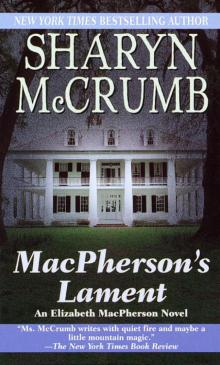 Elizabeth MacPherson 07 - MacPherson’s Lament
Elizabeth MacPherson 07 - MacPherson’s Lament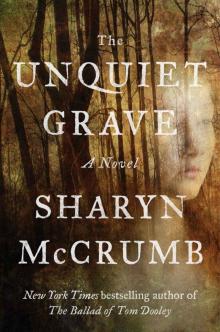 The Unquiet Grave: A Novel
The Unquiet Grave: A Novel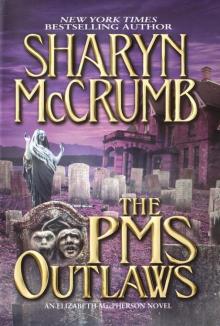 The PMS Outlaws: An Elizabeth MacPherson Novel
The PMS Outlaws: An Elizabeth MacPherson Novel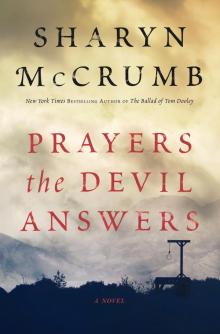 Prayers the Devil Answers
Prayers the Devil Answers Paying the Piper
Paying the Piper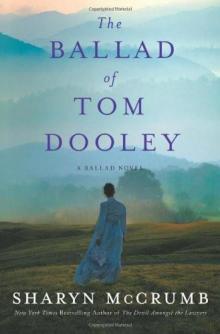 The Ballad of Tom Dooley: A Ballad Novel
The Ballad of Tom Dooley: A Ballad Novel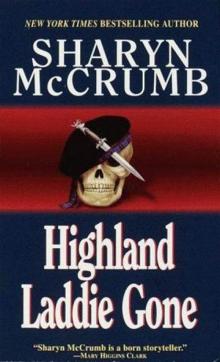 Highland Laddie Gone
Highland Laddie Gone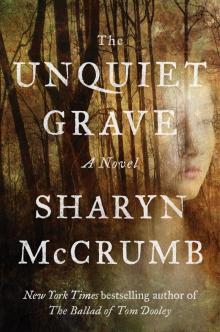 The Unquiet Grave
The Unquiet Grave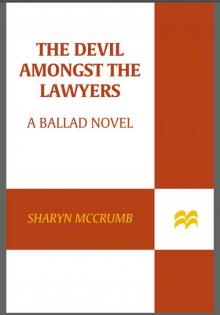 The Devil Amongst the Lawyers
The Devil Amongst the Lawyers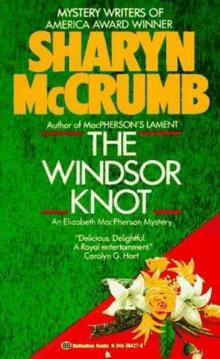 The Windsor Knot
The Windsor Knot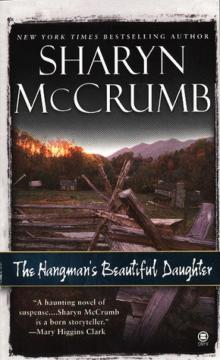 The Hangman's Beautiful Daughter
The Hangman's Beautiful Daughter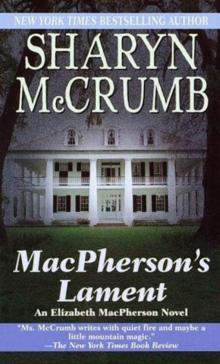 MacPherson's Lament
MacPherson's Lament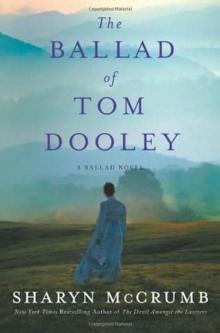 The Ballad of Tom Dooley
The Ballad of Tom Dooley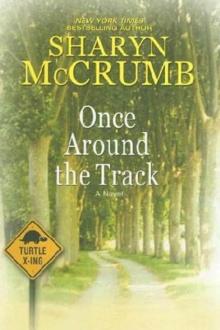 Once Around the Track
Once Around the Track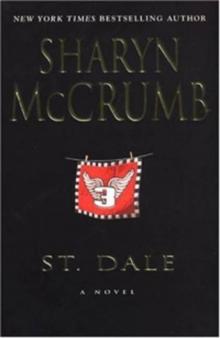 St. Dale
St. Dale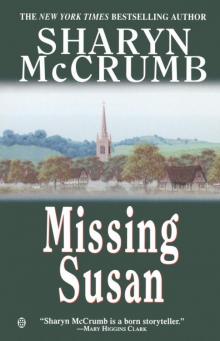 Elizabeth MacPherson 06 - Missing Susan
Elizabeth MacPherson 06 - Missing Susan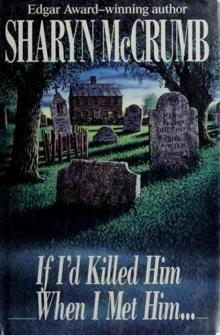 If I'd Killed Him When I Met Him…
If I'd Killed Him When I Met Him…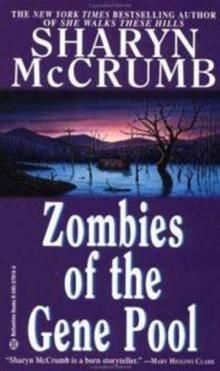 Zombies of the Gene Pool
Zombies of the Gene Pool Bimbos of the Death Sun
Bimbos of the Death Sun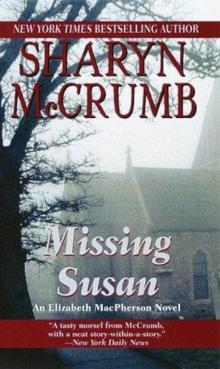 Missing Susan
Missing Susan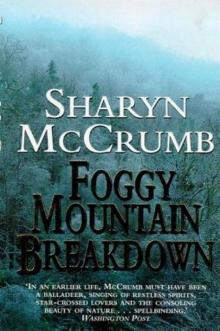 Foggy Mountain Breakdown and Other Stories
Foggy Mountain Breakdown and Other Stories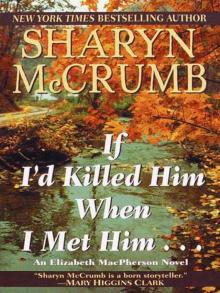 If I'd Killed Him When I Met Him
If I'd Killed Him When I Met Him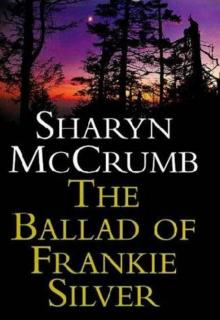 The Ballad of Frankie Silver
The Ballad of Frankie Silver Lovely In Her Bones
Lovely In Her Bones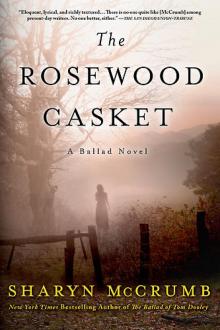 The Rosewood Casket
The Rosewood Casket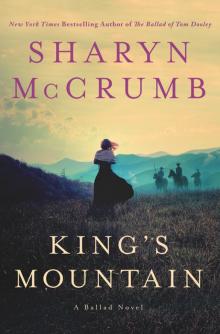 King's Mountain
King's Mountain